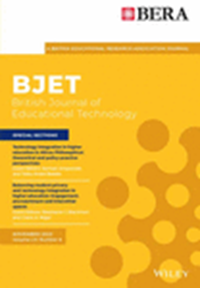English vocabulary learning through gamification with Tic-Tac-Toe in Flippity-Connecto: The prediction of gameplay self-efficacy to anxiety, interest and flow experience
Abstract
A wide variety of gamification tools are available for language learning; however, few studies have explored the impact of Flippity-Connecto (hereafter referred to as Connecto) on learners' cognitive and affective processes. Connecto, a game similar to Tic-Tac-Toe, was designed to assist students in learning English as a foreign language (EFL). This study utilized the Tic-Tac-Toe mechanism to engage students in competitive English vocabulary learning. Grounded in the achievement emotion model, this research examined the relationships among learning interest, gameplay anxiety and flow experience while students played the game. In a single-group quasi-experimental study, sixth-grade students from an elementary school played the game three times over a period of 3 weeks, followed by the completion of questionnaires. A total of 123 valid questionnaires were collected. Structural equation modelling results revealed that: (1) gameplay self-efficacy negatively predicted gameplay anxiety and positively predicted learning interest and (2) flow experience was negatively predicted by gameplay anxiety and positively predicted by learning interest. The finding that gameplay anxiety can enhance flow experience challenges conventional views, suggesting that anxiety may energize players when facing challenges, akin to being psyched up. These findings provide insights into the complex dynamics of gamified language learning, underscoring the importance of self-efficacy, anxiety management and interest in fostering EFL learning.
Practitioner notes
What is already known about this topic
- Gamification tools have the potential to enhance vocabulary learning.
- Games like Tic-Tac-Toe, known for their uncertainty and quick outcomes, contribute to player motivation.
- Flow, characterized by deep immersion and enjoyment during gameplay in language learning, can be hindered by learner anxiety.
What this paper adds
- We investigated the relationship between players' self-efficacy, activated positive emotions and deactivated negative emotions during Connecto gameplay, shedding light on the intricate dynamics of gamified language learning.
- We utilized the achievement emotion model to demonstrate that gameplay self-efficacy correlates negatively with gameplay anxiety and positively with learning interest.
- The results highlight how gameplay anxiety can enhance flow experience, challenging conventional views and suggesting that it may energize players when facing challenges, akin to being psyched up.
Implications for practice
- Connecto can be effectively implemented for EFL learners, particularly those demonstrating high levels of gameplay self-efficacy.
- Designers and developers can create gamification features emphasizing positive emotional aspects like competition to effectively engage players in language vocabulary learning.
- Leveraging gameplay self-efficacy and managing gameplay anxiety, gamification can become a powerful tool for fostering engagement and improving learning outcomes.


 求助内容:
求助内容: 应助结果提醒方式:
应助结果提醒方式:


